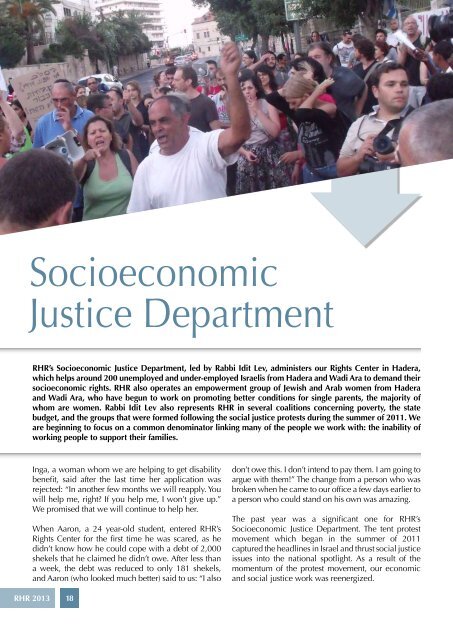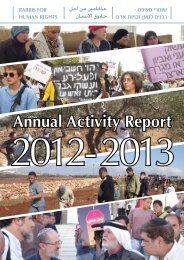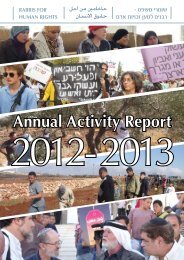2012- 2013
Create successful ePaper yourself
Turn your PDF publications into a flip-book with our unique Google optimized e-Paper software.
Socioeconomic<br />
Justice Department<br />
RHR’s Socioeconomic Justice Department, led by Rabbi Idit Lev, administers our Rights Center in Hadera,<br />
which helps around 200 unemployed and under-employed Israelis from Hadera and Wadi Ara to demand their<br />
socioeconomic rights. RHR also operates an empowerment group of Jewish and Arab women from Hadera<br />
and Wadi Ara, who have begun to work on promoting better conditions for single parents, the majority of<br />
whom are women. Rabbi Idit Lev also represents RHR in several coalitions concerning poverty, the state<br />
budget, and the groups that were formed following the social justice protests during the summer of 2011. We<br />
are beginning to focus on a common denominator linking many of the people we work with: the inability of<br />
working people to support their families.<br />
Inga, a woman whom we are helping to get disability<br />
benefit, said after the last time her application was<br />
rejected: “In another few months we will reapply. You<br />
will help me, right? If you help me, I won’t give up.”<br />
We promised that we will continue to help her.<br />
When Aaron, a 24 year-old student, entered RHR’s<br />
Rights Center for the first time he was scared, as he<br />
didn’t know how he could cope with a debt of 2,000<br />
shekels that he claimed he didn’t owe. After less than<br />
a week, the debt was reduced to only 181 shekels,<br />
and Aaron (who looked much better) said to us: “I also<br />
don’t owe this. I don’t intend to pay them. I am going to<br />
argue with them!” The change from a person who was<br />
broken when he came to our office a few days earlier to<br />
a person who could stand on his own was amazing.<br />
The past year was a significant one for RHR’s<br />
Socioeconomic Justice Department. The tent protest<br />
movement which began in the summer of 2011<br />
captured the headlines in Israel and thrust social justice<br />
issues into the national spotlight. As a result of the<br />
momentum of the protest movement, our economic<br />
and social justice work was reenergized.<br />
Rights Center<br />
RHR’s Rights Center provides Jewish<br />
and Arab residents of the Hadera<br />
and Wadi Ara region with advice<br />
and legal help regarding their<br />
socioeconomic rights. In <strong>2012</strong>, the<br />
Center served about 200 people,<br />
many of whom had first turned to<br />
RHR because of the subsequently<br />
defeated Wisconsin Plan. In<br />
addition, RHR began going doorto-door<br />
in selected neighborhoods<br />
in Hadera, informing people about<br />
the Rights Center. As a result<br />
of this proactive approach, the<br />
Rights Center received numerous<br />
additional requests for help. We<br />
deal with an average of 24 new<br />
cases per month. During <strong>2012</strong>,<br />
Rabbi Sigal Asher joined us at the<br />
Rights Center, as one of the four<br />
young rabbis/rabbinical students<br />
added to on our staff through<br />
a special grant, replacing Nico<br />
Socolovsky, who left to complete<br />
his rabbinical training in the US.<br />
The major focus of the center<br />
is to assist the unemployed and<br />
Composed of 20 Arab and Jewish women from<br />
Hadera and Wadi Ara, the majority of whom are<br />
single mothers, the group is currently addressing the<br />
socioeconomic rights of single parents. This year,<br />
they began working on extending annual subsidy<br />
given at the beginning of each school year to single<br />
parents to include high-school children. RHR hopes<br />
to create additional empowerment groups focused<br />
on other issues in other parts of the country where<br />
we already have a presence.<br />
Dorit explains the influence of RHR’s empowerment<br />
group: "To be able to express yourself is important;<br />
suddenly I see that I can speak without fear and<br />
without hesitating out of worry that I am saying<br />
something wrong.”<br />
Kulthum, an Arab woman fighting for the right of<br />
her daughter Ismi’ye to ride the district school bus<br />
underemployed with issues<br />
relating to rights available from<br />
the National Insurance Institute.<br />
This includes ensuring access<br />
to unemployment benefits and<br />
ensuring that employees have<br />
access to benefits such as paid<br />
leave, sick days, and assisting lowwage<br />
earners to pull themselves<br />
out of the cycle of poverty.<br />
While helping the unemployed<br />
and underemployed in Hadera<br />
and Wadi Ara to secure their<br />
social and economic rights, RHR<br />
will also identify issues requiring<br />
policy change on the national<br />
level. Helping to improve people’s<br />
lives locally is an essential part of<br />
our strategy to change the face of<br />
Israel nationally.<br />
Currently, RHR is launching a<br />
campaign based on a common<br />
denominator uniting many of the<br />
cases we are dealing with both in<br />
Hadera and elsewhere. Statistics<br />
indicate that at least one family<br />
Jewish-Arab Women’s Empowerment Group<br />
member is working in 52.9 percent<br />
of families living below the poverty<br />
line. Behind the statistics are real<br />
human tragedies caused by the<br />
combined effect of inadequate<br />
wages, an unresponsive system,<br />
and the growing holes in Israel’s<br />
social security net during our<br />
transition from a welfare state to a<br />
neo-liberal economy.<br />
RHR’s Rights Center found itself in<br />
the spotlight following the tragic<br />
suicide of the late Moshe Silman,<br />
who sought help from our Rights<br />
Center after meeting Rabbi Idit<br />
Lev at the social justice protests<br />
in Haifa (see below for Rabbi Idit<br />
Lev’s moving eulogy for Moshe<br />
Silman). Moshe’s story was a<br />
particularly tragic example of a<br />
much broader reality. With Rabbi<br />
Lev being quoted and interviewed<br />
in the Israeli media after Moshe’s<br />
death, we found ourselves<br />
inundated with calls from people<br />
in similar situations to that of<br />
Moshe Silman.<br />
said, "Suddenly, I said that I wanted to be strong<br />
like Ayesha [RHR social economic justice facilitator<br />
and field worker] and to request the right for my<br />
daughter [to bus transportation] in a loud, clear<br />
and confident voice, and to make it clear that I am<br />
requesting a right, not charity".<br />
RHR <strong>2013</strong> 18<br />
19 RHR <strong>2013</strong>









